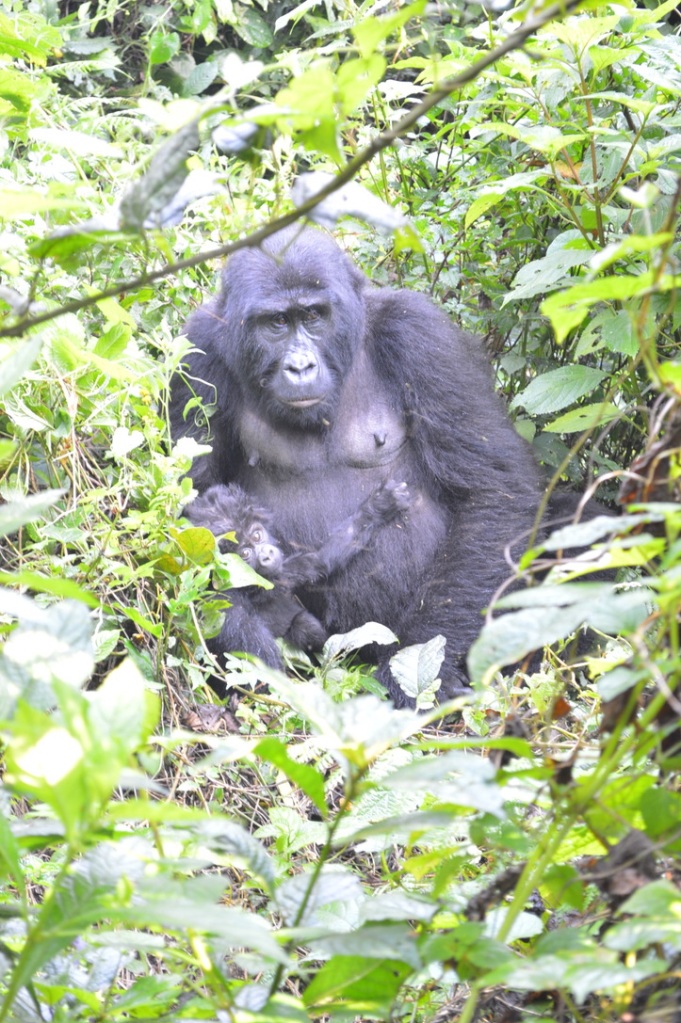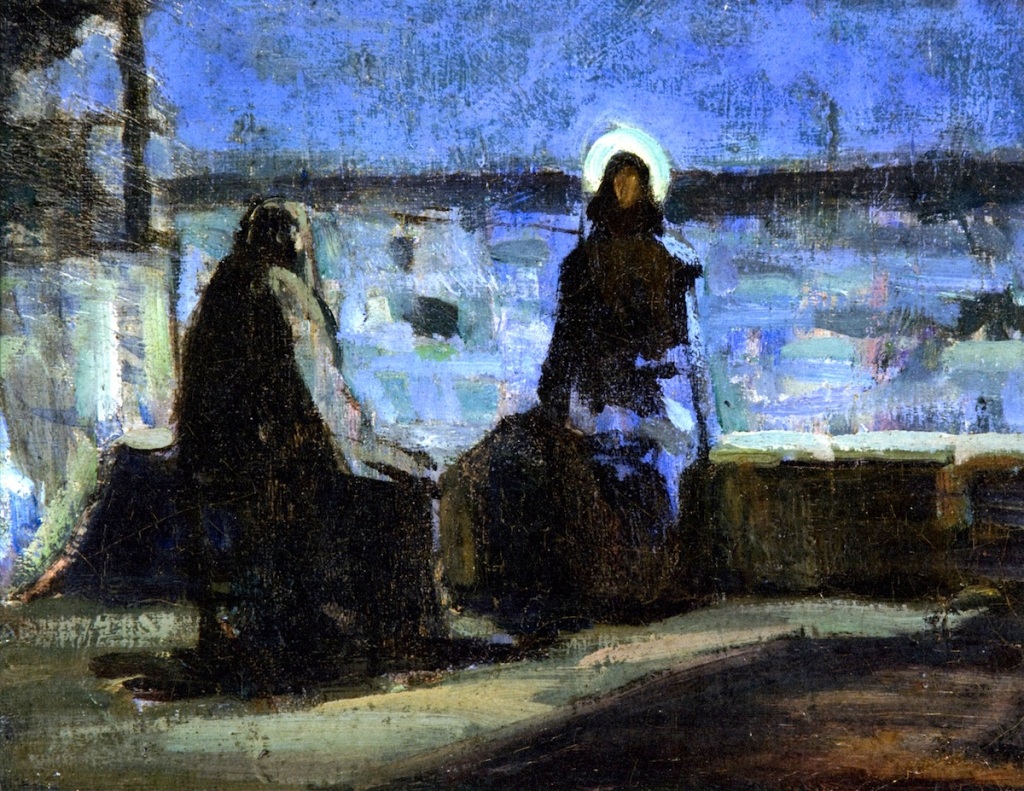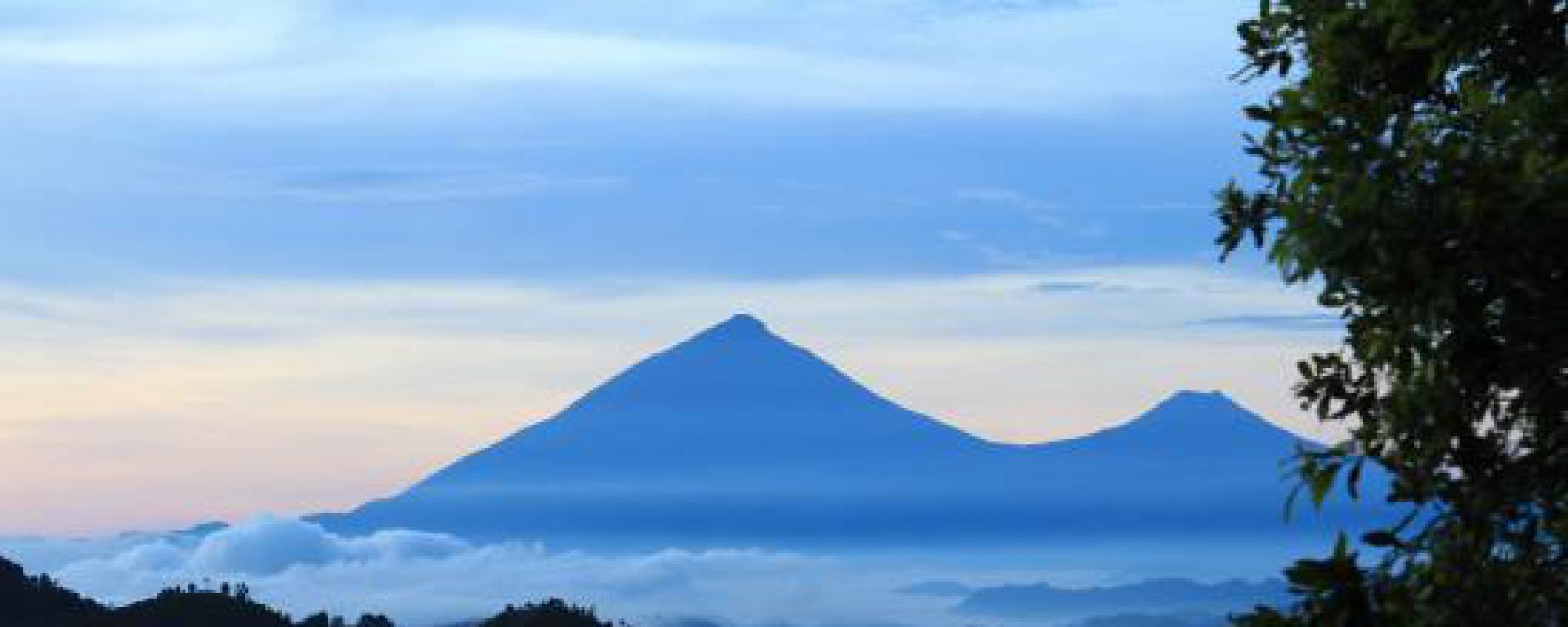Muhavura is an unabashed lover of the Uganda’s wild places. Few things make me quite as happy as leaving the precincts of the Greater Kampala Area. The feeling, as the insanity of Kampala subsides, and the countryside’s calmer nature takes over is always quite palpable. Entering our national parks, I often feel transported into another world, one where the mind wanders more freely, and much of what passes for important in our modern existence comes in for some scrutiny.

Muhavura’s first visit to the Bwindi Impenetrable National Park to see the famed mountain gorillas provided an opportunity for such scrutiny in ways that I could not have imagined. In our group of visitors were 3 young Britons and an Italian middle-aged lady. The trek up the steep forested slope from the Visitor’s Centre took us almost three hours (I had insisted on visiting the furthest group, that way I could ensure there were fewer tourists in our group, more opportunity for me to enjoy the experience.) We found the gorilla family quite unexpectedly in a small clearing in the forest, and spent about an hour with them. The one word that kept coming to mind to describe the experience was “surreal”. It almost feels like being inside a simulation. A video game. Not something real. Like the gorillas could not possibly be real.

The best characterisation of the gorilla experience was provided by the Italian lady. A practicing psychotherapist, she told me that she first saw a photo of a silverback at an art gallery in her home country. What struck her is that the more she looked at him, the more he looked like a man wearing a mask. Or she was wearing a mask and he wasn’t. She couldn’t be sure which was which. And so she made up her mind to come and see them in their natural habitat. What she saw was very moving, she said. The simplicity of life among these ‘savages’ that were so much like us. The importance of valuing our differences and (therefore?) our particular roles in society. “I have practiced for twenty five years, seen many patients, and I can tell you I don’t understand modern human beings,” she said. “Gorillas I understand. We humans have created so much unnecessary complexity in our lives!”
The young Britons were equally touched by their experience. You could tell by the way they spoke of the different gorilla family members we met in almost human terms. It was, for all of a us, a deeply moving experience.

Speaking to my fellow trekkers, I realised for the first time a core aspect of the gorilla experience. People come to see our wild places and animals because, I think, it taps into a deep primal desire to reconnect with the natural environment of their ancestors. Much of the modern way of life tends to draw us farther and farther away from what is ‘real’. We live more and more in a world abstracted away from reality, with our engagement to it being replaced not by the real thing but by a representation of it. That is, milk from a carton, never an udder in sight. Or lions as seen on YouTube or Nat Geo. Most of us have never been close enough to a lion to experience the cold indifferent stare in its eyes, or to see the millions of fleas on its coat. Or to experience that rather unique scent of the lion pride. (Cat piss and stale meat, in case you were wondering.)
Gorillas are different. I think that people who visit gorillas go through a sort of therapy that $10,000 couldn’t buy. They get to see themselves. A simpler, more content, more real version of themselves. The experience, especially for foreigners, is deeply moving, at the bargain price of $750 per permit. (250,000/- per permit for Ugandans, in case you were wondering.)

After that flash of insight, I inevitably had to contrast it with how we as a country present the gorilla experience to the world. First, I looked at the advertising. By Uganda Tourism Board and others. It is difficult to have anything kind or complimentary to say about our gorilla marketing, so I’ll not try. Second, I remembered the road I’d travelled on to Bwindi. From Kampala to Rukungiri, the tarmac is passable. From Rukungiri to Kihihi, the road is being worked on, a few sections are still poor but passable with a decent 4WD vehicle. It is the 35km from the Kihihi – Rukungiri road junction at Kanyantorogo to Buhoma town (where the park headquarters are found) that is, let’s just say, interesting. It takes over an hour to cover that short distance. Below is a short video of the greater part of the road experience.
And so I started wondering, again, what is wrong with us as a people. How is it that our decision-makers always manage to display such a dearth of imagination? Bwindi is the leading tourism attraction in Uganda by revenue. By far. How is it that our decision-makers have not only clearly failed to understand why that is (and therefore how to market & correctly price the attraction), but have also continued to collect their conference per diems while the road to Buhoma is in such a sorry state? Every day we hear of more feeder roads being constructed in and around Kampala. Presumably so that mid-level managers at Stanbic or DFCU can get to their jobs faster and with less traffic. Most of these roads cost more than what the Buhoma road would cost to tarmac. And we can surely make the case that breaking fewer spines on the way to the gorillas is as important to our overall economy as making it easier for Doreen to get to her desk at Crested Towers! And, please, let’s not blame the donors again that they only give us money for town roads. That’s like blaming one’s inability to eat the meal served on the absence of a recyclable fork!

As anyone who has thought about this for more than a few minutes will tell you, the lack of imagination on abundant display in this country has its roots in our turbulent past. Our decision-makers, like most of us, are the first generation in their family not to live in abject poverty and political/economic uncertainty. What that does is to sharpen our resolve never be poor again, and to store so much silver to enable us ride out any future turmoil. All the cutting of corners, the theft, the construction of ever larger (and emptier) malls and apartment blocks is nothing but storing up of (what we hope is) silver. The imperatives are perfectly understandable. But there is a price. When the human brain is so focussed on where to find the next morsel, there is not much space left for imagining, for the wandering of the mind, for curiosity for its own sake. Therefore true leaps of insight and imagination become almost impossible.
Worse, we become resentful of anyone who has been able to transcend that trap, anyone who nags us with visions of a better world. Muhavura sees this character streak often in this country: People who demonstrate true ingenuity, who try to show us a better way, seem to attract much effort to pull them back down to a more crass level. We seem to hate to have it revealed to us that we lack imagination. We seem to recognise, deep down, that there is something fundamentally wrong with the current model, but feel too embarrassed to admit it.

What is increasingly clear, is that the model we have lived under is not working. It is stifling opportunities (surely there is something deeply wrong when our leading export is young, able-bodied members of our society), it is wasting resources (all those empty monoliths of cement and steel that are our malls/apartments without tenants), and it is creating a dejected future generation (armies of foreign-educated offspring of the elite, who can’t find what to do with themselves, even with daddy’s money and connections). It seems to me that we are hurtling towards a reckoning.
The reason for this is I believe rooted in the fact that we have, unlike our gorilla cousins, forgotten the importance of our differences and how they can make us, together, stronger. We live in silos. We refuse to defer to those who might advise us, or who might provide good leadership. We are our own advisors, or worse still, we keep the company of bad, sycophantic advisors. And so all the bad ideas get amplified, as our poverty of the mind keeps a tight grip on us. To give an example, our neighbour Rwanda doubled the price of gorilla permits to $1,500. Our gorillas and theirs are exactly the same. There has been no drop in visitors to the Rwanda side. Muhavura has not heard any of the decision-makers here weigh in on why Rwanda’s decision is either very dumb or one we must emulate. Of course the evidence favours the latter. The point is we seem to have simply ignored their example. (Rwanda’s decision came with other changes, so please, dear decision maker, do not rush to simply copy and paste.)

But there is a way out, and to explain it Muhavura must take you back 2000 years. There was a man called Nicodemus, a Pharisee at the time of Christ. Nicodemus, realising that there was something unique about this strange preacher from Galilee, comes to Christ at night, to find out what he is all about. Out of their conversation comes perhaps the most famous verse in Christendom (John 3:16). There is strong evidence that Nicodemus is transformed by his encounter: He manages to stop his colleagues in the Sanhedrin from sentencing Christ before he is heard (John 7:50), he provides the embalming spice after the Crucifixion (John 19:39).
Nicodemus, a Pharisee and a member of the Sanhedrin (a sort of Supreme Court and Parliament rolled into one), could not possibly be seen to be taking advice from a woolly-haired preacher man from the sticks! So he came at night. In secret. And he asked in secret what he needed to know, and learnt something and was transformed.
And right there is the model that we could adopt. It is normal to feel resentful of those that are not like us. It is normal to fear to admit that we don’t know, or there are things we suspect others know and that they could teach us something. But rather than silo ourselves, may be in 2023 (and beyond) what we need to do more and more is learn from Old Nicky. There is a world to gain, and nothing to lose. Happy New 2023.
